#Speaking strictly as a comic it's probably one of the best “meta” superhero takes on superheroes I've seen in a while
Explore tagged Tumblr posts
Text
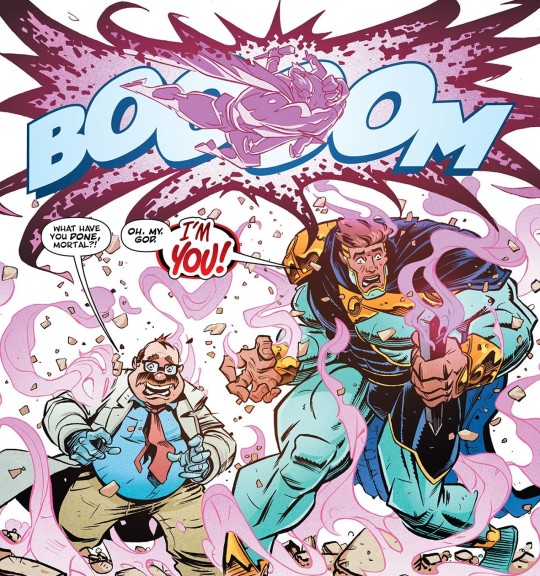
A cool find I think followers of this blog will enjoy: Image Comics recently finished publishing a series called The Schlub, which is about a loser dentist who accidentally switches bodies with a super hero- could have been gayer, of course, but a fun read.
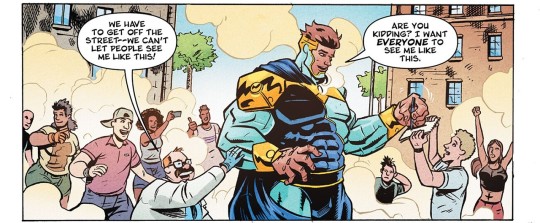
I bought a physical copy like a good boy (support your local comic book shop!) but if you look for it online, it's out there. I also went through and pulled some screenshots of pages that caught my eye.
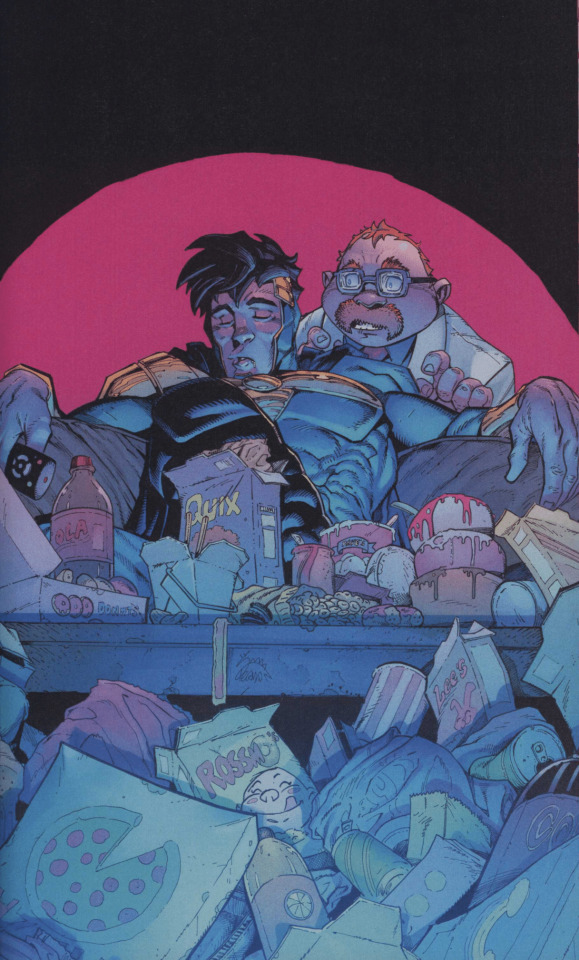
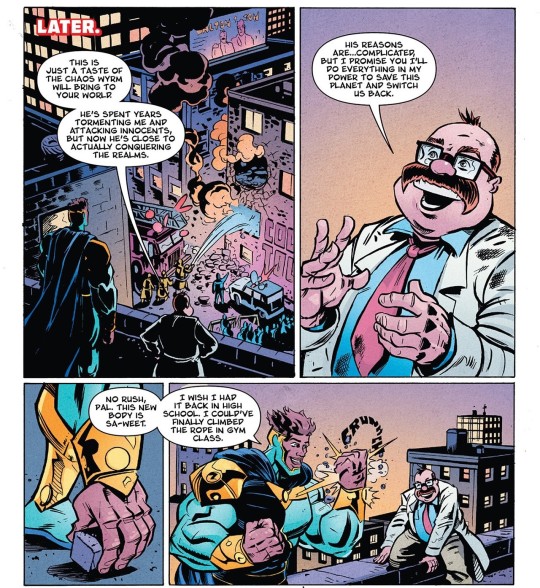
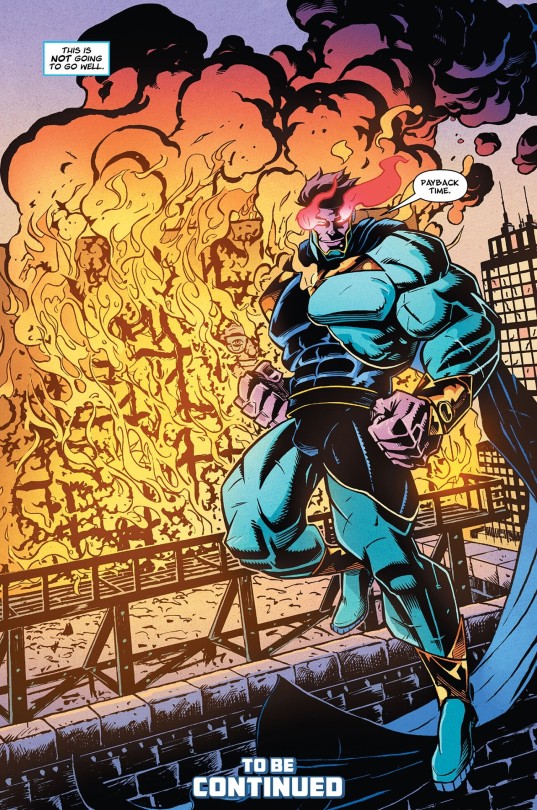
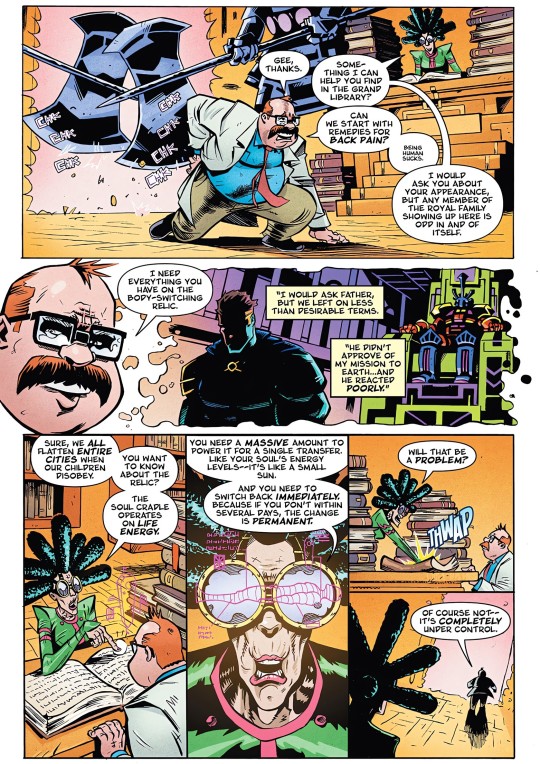
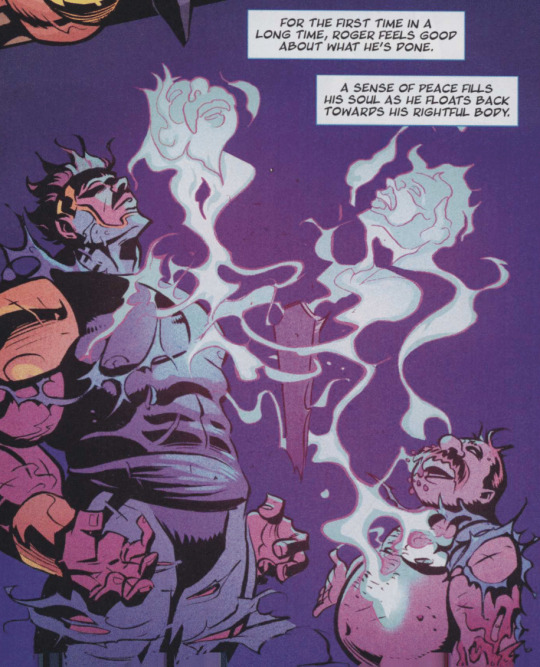
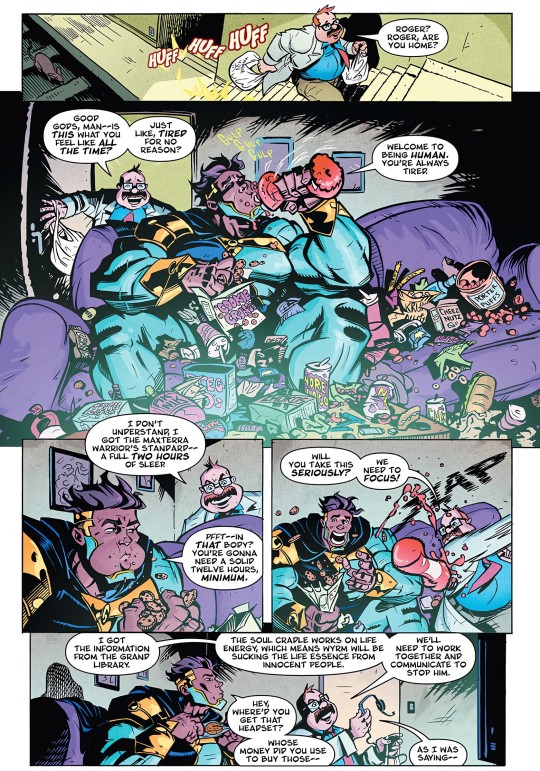
#male body swap#tf media#Speaking strictly as a comic it's probably one of the best “meta” superhero takes on superheroes I've seen in a while
168 notes
·
View notes
Text
Why Rebooting is bad and why continuity actually matters
A noteworthy individual in the realm of comic book podcasting by the name of Michale Bailey has stated on more than one occasion that Spider-Man could use a continuity reboot.
Let me explain in a 5000+ word essay why this is so wrong.
To begin with full disclosure on Bailey.
Bailey is a DC fan. A MASSIVE DC fan. He’s a Superman expert and his fav villain is Joker.
He likes Marvel but in a very secondary way to DC. His favourite Marvel characters are Hulk and Captain America. He likes Spider-Man but is no expert on him and is nowhere near as passionate about him as he is Superman.
The problem with him and many DC fans who are so quick to advocate for a reboot for various Marvel characters is that they ignore important context.
To begin with I honestly do not think most people who are DC fans first and foremost understand the value Marvel fans place on continuity, or at least they themselves do not place as much value by it.
From ground zero of the universe it was made clear continuity mattered. If the Marvel Universe was the United States then alongside relative realism and human flaws an attempt at good continuity would be part of the Bill of Rights.
I think the reason DC fans are more quick to dismiss continuity or the value Marvel fans’ place in it is because for DC continuity means far less, far less to the point where it has honestly become meaningless.
Continuity over at DC meant only as much as any given writer cared about it for the longest time. William Moulton Marston might’ve given the Baroness a redemption arc in his Wonder Woman run. Alfred Beagle’s transformation from a tubby clean shaven guy into a lean, moustachioed gentleman might’ve been explained via him going on dietary vacation. DC might’ve been inspired by fans’ letters to explain Barry Allan reading a Jay Garrick comic book via the establishment of Earth 1/Earth 2.
But all these were loose exceptions. Marston was putting in more effort than his peers of the day. DC were mandated to change Alfred’s appearance but didn’t bother to explain his name changing from beagle to Pennyworth which happened arbitrarily. And whilst DC established Earth 1 and Earth 2 they only did so because fans kept asking them what the deal was, when Barry Allan debuted they did just casually ignore the fact that Jay Garrick had existed in the way he did.
Day-to-day though consistency and continuity, the attempt to make the stories one big narrative was arbitrary at best. Superman was suddenly Superboy in his teen years and s an adult went through dozens of new powers that showed up and got dropped just as easily. Each story didn’t matter to the next one and could be read in any order regardless, etc.
DC only started trying to get deeper with continuity pretty much as a RESPONSE to Marvel emphasising continuity from 1961 onwards.
And event his was clumsy and problematic due to their long history of NOT doing that, meaning their universe was adopting continuity and trying to pretend those rules should all of a sudden apply to a universe that up until then was anethma to it.
It’d be like if the Simpson suddenly tried to apply legitimate Marvel style continuity after all the years of Homer having a million jobs and the family going through all these zany experiences that reset by the start of the next episode.
Where continuity worked for DC it did so in tittles like Swamp Thing or Teen Titans where there was a comparatively cleaner history to work with, where continuity might not have strictly speaking existed but where it also hadn’t been as aggressively ignored either.
Unsurprisingly then when it came time to reboot the DC Universe with Crisis on Infinite Earths that the Titans history was retained mostly unchanged (though their writer Marv Wolfman also writing Crisis probably had something to do with that too).
Crisis on Infinite Earths was done EXPLICITLY to reorganize the DC Universe to better resemble the Marvel Universe and having a greater sense of continuity was a MASSIVE part of that.
Suddenly Superman’s history was streamlined and events in his life followed a greater degree of cause, effect and repercussions as opposed to the rotating door of arbitrary stories that can be read in any given order because the status quo would snap back come Hell or high water anyway. Suddenly he and Lois relationship had a flowing narrative where one event could impact the next building and building until they were dating, then in love, then engaged, then married.
The same generally held true for most of the DC universe, in fact the Universe as a whole now had a greater degree of cohesiveness as the Earth 2 heroes like the Jay Garrick Flash were established as existing in the 1930s and 1940s with the more iconic characters like Superman, batman, Wonder Woman and Barry Allan’s Flash having come in as the next generation of heroes as opposed to there being an arbitrary invisible line where everyone transitioned from Earth 2 into Earth 1.
Now the question to be begged is...WHY did DC feel the need to reorganize their universe in this way? Why did they feel the need to tear their house down and rebuild it in a style more similar to their competitor’s?
Because...their competitor was doing better than them that’s why.
Between 1961 when the Marvel Universe began and 1985/1986 when Crisis on Infinite Earths unfolded, more often than not Marvel DOMINATED DC.
And since continuity was a big part of that DC opted to hit the rest button and essentially do a second draft on their characters and their universe taking into account the lessons they’d learned from Marvel’s success, continuity being one of the biggest of those.
I believe it was Mark Gruenwald who used to joke that Marvel didn’t need to reboot their characters like DC did because they ‘got them right the first time’.
And to a large extent...he was absolutely right, and Crisis on Infinite Earths is a testament to that.
And one of the biggest reasons why is because DC DID improve their sales. And I do not just mean they improved them because of their new spat of #1s or the EVENT that was the rebirth of their characters. I mean by the late 1980s and early 1990s their characters were competing far better with Marvel than they had done before. Though still in second place more often than not.
But there were still problems with their universe, ramifications of rebooting that made things muddled and confusing in ways they hadn’t been before. Hawkman is the most talked about example of this to the point where I don’t even know how to explain what the contradictions are. Same story with Power Girl and Donna Troy who’s histories and origins became so convoluted that they were the subject of jokes in and out of the comics. Donna Troy’s history was such a mess there was even a story made to specifically try (and in my opinion failed) to resolve the clusterfuck her very existence had mutated into.
DC decided to clean things up a little with Zero Hour and do a less extensive reboot of their universe. Everything set up via Crisis on Infinite Earths mostly stayed the same apart from a few things.
That was the first warning sign though. The first sign that the universe they’d rebooted into existence was not structurally integral precisely because they’d rebooted it into existence.
Then came guys like Mark Waid, Dan Didio, Mark Millar, Goeff Johns and Grant Morrison and so many others, children of the pre-crisis DC universe (specifically the continuity toxic Silver Age) who were upset at it’s destruction and being replaced by the post-Crisis DC Universe.
In their works and under their tenures much of the Silver Age was in one form or another reintorduced into the post-crisis DC universe created very specifically to exorcise most if not all of that stuff.
Barry Allan, Kara Zor-El, Kandor, etc. Shit, Grant Morrison did the acclaimed All-Star Superman series from 2005-2008 which was flagrantly a love letter to the whacky Silver Age Superman stories of the 1950s and 1960s. That was out of continuity but Mark Waid went further by kinda sorta said that Superman hung out with the Legion of Superheroes in his teen years, something very explicitly exorcised from the post-crisis version of Superman.
Was this a case of these creators simply subconsciously drawing upon their childhoods?
Nope, not even a little bit.
They were very consciously and very deliberately trying to in some way shape or form resurrect the characters, elements and universe they had known and loved and apply it to the version of the universe that had in effect killed and replaced the one they’d known and loved.
They didn’t even try to cover this up.
I believe it was Dan Didio who once said he and Geoff Johns almost entered DC comics specifically to bring back Hal Jordan and Barry Allan.
And Mark Waid even as late as 2008 when he was interviewed about Brand New Day has stated that he felt extremely upset over losing the pre-crisis Superman who was replaced by the John Byrne post-crisis Superman.
Legend has it that not long after the post-crisis era began he even asked Byrne (or someone from DC) about ‘when the real Superman’ would come back.
Hell he did Superman Birthright a story that out of the blue gave use yet another new spin on Superman’s origin that was different to John Byrne’s post-crisis take on the character’s origin, though DC didn’t outright say one was supplanting the other.
They were not alone.
Brian Meltzer stated in regards to his Identity Crisis storyline that he loved the Silver Age of the DC universe despite people proclaiming it to be silly garbage.
Neil Gaiman in a one off Batman story he did made a meta commentary proclaiming his love for the Adam West Batman show.
And, though he didn’t work much in the post-crisis DC universe, acclaimed author Alan Moore took Image comics character Supreme, who was created essentially as a Superman rip-off, and proceeded to even more flagrantly rip-off Superman by morphing Supreme into Silver Age/pre-crisis Superman. Supreme like Superman even had a younger female family member and a super dog. They might not have been beat for beat Supergirl and Krypto, but it was obvious that those were who they were meant to be. He’s even been known to have said that the post-crisis Superman ‘ruined’ what Superman was supposed to be.
The love for the pre-crisis Silver Age had to varying degrees rubbed DC fans the wrong way but they didn’t know what they were in for because in 2006 DC unleashed Infinite Crisis.
Like Zero Hour this was a storyline that rebooted elements of the DC Universe but not as extensively as Crisis on Infite Earths had, though it was nevertheless far MORE extensively than Zero Hour.
How in love with the pre-crisis era and the Silver age was Infinite Crisis?
Well it reinstated the Multi-verse and Earth 2, two explicitly silver age concepts that were equally explicitly removed by Crisis on Infinite Earths.
It swept aside all of Power Girls various history since Crisis on Infinite Earths and just stated she was Superman’s cousin, but not the post-crisis version. She was literally the exact same pre-crisis version of Power Girl who (it was explained) had simply surived erasure during Crisis on Infinite Earths.
It brought back notable pre-crisis characters like Superboy Prime, Alexander Luthor oh and the Earth 2 Lois Lane and Superman who, I will remind you, were literally supposed to be THE Superman and Lois Lane from ACTION COMICS #1!
Then as part of the ramifications of the continuity changes instituted by Infinite Crisis Superman’s history was once more reworked to now explictely reintegrate his silver age history as Superboy and membership with the Legion of Superheroes as well as Lex Luthor knowing him in Smallville.
Yeah, it was pretty obvious what was happening. The guys in charge missed the pre-crisis days of DC and were trying to bring it back.
And this is the crux of why REBOOTING DOESN’T WORK.
The argument from people like Bailey is that if creators like this didn’t try to recreate their childhoods like this and remained committed to the rebooted universe established when they walked into their jobs the rebooted universe could work.
Except reboots by their inherent nature make that possibility extremely unlikely if not outright impossible.
Superhero comic books are a medium in which the reader pays money at least once a month for years-decades following the lives of the protagonist characters in a greater degree of detail than pretty much any other medium could muster.
Much like novels comic books go inside the characters heads forging a personal connection between them and the reader the likes of which is less likely and less frequent than with TV or film characters because that degree of intimacy is rarely present.
However unlike novels comics do this not only to multiple characters at a time but also get published more frequently.
As much emotional investment the average readers might have in Hermione Granger and Ron Weasley or Neville Longbottom, the fact is because they are not characters who’s heads we inhabit to the same degree as Harry Potter’s meaning there is less likely to be as personal connection forged.
This isn’t the case in comic books where we do, to lesser degrees, inhabit the head spaces of supporting cast members and even villains very, very frequently, meaning readers on average have (compared to the Harry Potter characters I listed) likely a greater degree of investment in characters like Foggy Nelson, Mary Jane Watson, Lois Lane, Alfred Pennyworth, Robin, etc. It even applies to villains even if the readers obviously do not feel sympathy for those characters.
And that form of intimacy between characters and readers happens across a mimimum of a month to month basis, not maybe once a year if a novel series is really on it’s game.
Consequently comic book fans moreso than in any medium, even daily shown soap operas, follow the metaphorical LIVES of these fictional characters.
And unlike soap operas they have to pay an inordinate amount of money for the pleasure of hanging out with those characters that they have that connection to.
So when a reboot comes along and essentially DELETES those characters and at best replaces them with new versions who aren’t the same in various ways it is the equivalent of taking away your beloved friend or pet and presenting you with a new friend or pet who’s sort of similar but obviously not the same thing you knew and loved, but asking you to accept them all the same.
And there are major ramifications to doing that have very long term ripple effects.
The most obvious one being that companies will LOSE the business of the old fans, which is exactly what happened with the New 52.
But more poignantly it is a veritable GUARANTEE that old fans will become VERY embittered and seek to in some way restore the characters they knew and loved, often by tearing down or warping the things that erased and replaced them.
At the same time erasing and replacing one version of the characters and universe with another sets a dangerous precedent even for creators who do NOT have an emotional connection to bygone eras.
That being that it can be okay to erase and replace things whenever they damn well please.
Or to put it another way...nothing matters.
The problem being the inherent nature of the comic book medium REQUIRES the readership to care.
It REQUIRES that emotional intimacy and connection to grow and be maintained in order for them to keep coming back and wanting to follow the lives of the characters.
And when you make it clear that whenever convenient everything you’ve spent time, money and emotional energy on can be utterly invalidated what is the point of bothering at all.
Now I know the argument would go ‘but for NEW fans that isn’t the case’
Except it is.
The halcyon days John Byrne likes to wax lyrical about when the readership would rotate every five years are DEAD and they’ve BEEN dead for decades. They died essentially the moment Marvel instituted continuity.
Because in instituting continuity it actively encourages people to CONTINUOUSLY read the series and follow the character.
Marvels’ success and DC’s greater success post-crisis have PROVED that that creative model is simply more popular and profitable than operating under the idea that the readers invest for a little while before they notice the illusion, that nothing matters and then consequently leave to be replaced by new people who’ve yet to notice that.
But in this day and age trying to maintain that illusion is not just a mountain to climb, it’s downright financially irresponsible.
We live in an age where the average audience member for any given piece of media is intrinsically more genre savvy than they were 20-80 years ago.
An age where there are countless instantly accessible websites discussing storytelling quirks and mechanics, where there is a whole website called TV tropes detailing every trope in storytelling known to man and giving vast EXAMPLES of them within popular stories.
An age where there are highly popular internet reviewers who deconstruct and point out those tropes thus training up their audience to spot them too.
And if you think they’re just over in a little corner think again.
Before his death notable film critic Roger Ebert recognized the work of the Nostalgia Critic who has won awards for his internet based awards show.
The acclaimed TV series Community actively engaged with the TVTropes website when writing it’s episodes, laying layer upon layer of meta commentary upon almost every episode and being hailed as the most genre savvy show on television.
The filmmakers of the Winter Soldier and Civil War movies took note of the internet series ‘How it Should have ended’ in order to make the resolution of their movies as watertight as possible.
The director of Kong: Skull Island went on a rant about a popular internet video series that pointed out problems in his movie and he even guest starred on another similarly popular internet series to point out further problems with the film in person.
Combine the above with the existence of trades, internet resources, info books and just discussions about comic books on social media and podcasts and the notion that most if any potential new readers are going to be fooled by the illusion that the comic books they are financially or emotionally investing in actually matter becomes less and less likely by the day.
Hell I was a kid with little internet access who wasn’t a big DC guy and who hadn’t read Crisis on Infinte Earths but I KNEW about it.
The rebooting of your universe is such a huge colossal thing that it’s something that comic book fans pick up on very quickly upon entering into the hobby just via osmosis.
That was in the days when the internet wasn’t what it is now, so the notion that you can trick new people into not realizing the stories they are investing in can be thrown out the window at any moment is ludicrous because they WILL know about reboots very quickly.
Sure, you could argue that the relative success of the post-crisis era proves that even KNOWING about reboots as a potential phenomenon doesn’t mean that they won’t be successful so why NOT do them?
Because again, I think that ignores the context of the time period.
I don’t think MOST people (even the creators involved) actually realized or had the mentality that reboots could be a recurring phenomenon.
I think fans and creators alike entered into the post-crisis era truly believing that Crisis on Infinite Earths was a one off affair and now that the DC universe had been ‘fixed’ or ‘realigned’ or whatever you want to call it, that was that. It wasn’t going to happen again. Sure there was Zero Hour but that was to clean stuff up and reinforce the new universe they’d made, not a desire to scrap what’d come before. It was a patch up not a clean slate deal.
In a sense Infinite Crisis was a testament to this. It demonstrated a desire to reboot again but also a sense that it was somehow taboo to do so thus it didn’t go all the way.
But then in 2011 we got the New 52, something that J. Michael Straczynski has stated Dan Didio had wanted to do for years. And if you pay attention to it you will see more than a few pre-crisis elements present in it. Wonder Woman’s mother being blonde haired. Superman being single and a lonely alien. Few if any legacy characters, etc.
The new 52 was the most extensive reboot SINCE crisis on infinite earths and it so colossally backfired that in 2016 DC launched Rebirth which has since then been essentially transforming the New 52 BACK into the post-crisis era.
And whilst yes a major reason for that was the overall poor quality of the universe, the fact is another major reason was that same invalidation of reader emotional investment made worse by the further erosion of the illusion that the stories matter.
If the post-crisis era that lasted almost 30 years could be swept away so casually, why give a damn about anything the new 52 had to offer? Why give a damn about this universe when Dan Didio EIC of DC STATED that he feels that there SHOULD be a reboot every so often, that the stories you have spent time, money and energy on in the here and now SHOULD be erased and invalidated.
It was demonstrable of a fundamental misunderstanding of why the modern comic book reader of the last 50 or so years picked up a book. They weren’t looking for a disposable adventure, they were LOOKING to emotionally invest. The ball game had intrinsically changed in the 1960s thanks to Marvel and largely thanks to their institution of continuity, flawed as they hemsleves might have been in applying it at times.
Again, thing is part of why we got Rebirth. It’s called REbirth for a reason. It’s because the world and universe that is coming out of it is like the one people knew and loved.
Superman is again the most poignant example of this as his history via DC Rebirth has been nce more changed but this time changed BACK into what it was more or less just before the New 52.
I think that for a lot of fans there is a HOPE with Rebirth that DC have actually now recognized reboots as destructive and that they are now endeavoring to reorganize their universe back to what it was and, as was the case post-crisis, honestly leave it that way. Hope for this recognition is corroborated by the in-universe meta-commentary by the cosmic entity Metron during the Convergence storyline, during which he more or less said the DC universe cannot survive another reboot and then sent heroes to outright prevent Crisis on Infinite earths from ever happening, literally preventing the first ever reboot from happening and thereby all the ones thereafter.
DC at the time of this writing are doing great. Depending upon who you ask they are even financially beating Marvel and DEFINITLY creatively kicking Marvel’s ass.
However throughout the ups and the downs I’ve listed with DC the fact remains that Marvel more often than not have always trumped them in sales.
There have almost always just been more people who want to read and financially and emotionally invest in Marvel’s characters and universe than DC’s. You can’t handwave that off on the success of media adaptations either. Marvel’s media dominance didn’t truly begin until 2000-2002 with X-Men and Spider-Man and prior to that DC had a larger number of higher quality cartoon shows like Batman and Superman the Animated Series, the former of which even got shown on Prime Time.
And yet Marvel continued to trounce DC most of the time and among it’s highest sellers, among the franchises which routinely beat MOST of DC was...Spider-Man.
Spider-Man who’s whole concept was for him to be relatable, that is to say his whole concept was actually BUILT around the idea of making you the reader emotionally invest in him. Whilst Batman and the Fantastic Four might’ve held that ambition generally speaking for Spider-Man it was intrinsic to who he was, he was MADE to be like (what Stan Lee believed was) the average reader (relatively speaking).
And then...you followed his life.
There is perhaps no character in Marvel’s history who’s life has been AS detailed and fleshed out as Spider-Man’s.
He has no dark mysterious past like Wolverine or Deadpool.
His story didn’t begin with him as an adult who’d lived a long life upon his debut like Reed Richards or Bruce Banner.
And he wasn’t a member of a team, but rather the lead in his own right unlike the Human Torch or any given member of the X-Men.
Consequently what we got was a character who debuted with you knowing almost everything about him. he hadn’t lived long enough to HAVE a past of mystery or life experiences you could pull out the bag for big flashy reveals. And the story was DEVOTED to his life and his journey of growth.
All of this has led Spider-Man to being both the most (relatively) realistic character in Marvel’s canon and the one who encourages the most emotional and thereby financial investment.
Because not only are you supposed to identify with him but you can honestly watch him grow up, you can watch him evolve even alongside yourself and see him hit life milestones we all are familiar with even if we have not ourselves hit them.
And just to prove that it was no fluke Marvel created a wholesale second version of Peter Parker in the form of Ultimate Spider-Man and succeeded in the same experiment AGAIN.
But following Peter’s life, his development and emotionally investing in him REQUIRES continuity to be intrinsic to his narrative. It is a REQUIRMENT that within the fictional realm he inhabits there is to a large extent a sense of cause and effect and a forward moving passage of time.
Continuity reboots DESTROY that because they rip out a character’s past and make it clear to the readers that the cause and the effects are illusionary and don’t actually matter.
Couple that with the greater degree of emotional investment Spider-Man’s story encourages and rebooting him would be positively disastrous.
And that’s not even a hypothetical.
It proved disastrous when they rebooted him IN FILM a mere five years ago and even his soft reboot from 2007 has had vast damaging ramifications for the fanbase. Not AS bad the new 52 because the fanbase still holds onto the idea that something like OMD won’t happen again. But realistically the precedent has been set now.
Now sure...you could flip the script on some of what I said. You could argue that OMD is representative of how, continuity or not, reboots or not, creators will always reinvent their childhoods come hell or high water so why NOT reboot?
The answer being that when you have a continuity driven narrative that HASN’T had the precedent of rebooting it established creators recreating their childhoods nevertheless becomes more difficult and becomes less likely and easier to fix by writers who aren’t blinded by their nostalgia goggles.
Case in point, Marv Wolfman didn’t ACTUALLY put Spider-Man back into High school.
Dan Slott didn’t LITERALLY have him date Deb Whitman again.
Joe Quesada didn’t ACTUALLY go through with resurrecting Gwen Stacy, even though he came damn close.
Shit even with One More Day Marvel tried to sort of compromise between removing the marriage and just erasing those stories outright by (falsely) claiming every story happened the same way except they happened to not be married. They TRIED to keep as much continuity as possible. They even made a point of resurrecting Harry Osborn in a way that didn’t just Crisis style reboot his history, but in-universe explained his resurrection.
Why?
Because they KNEW there would be vast negative ramifications if they did anything more extensive.
Oh...and because they KNEW continuity was an important part of storytelling and financially profitable.
Like...their whole company was testament to that.
And wider pop culture corroborates that.
Soap operas.
YA novels like Harry Potter and Hunger Games
Telenovels such as Breaking Bad, Game of Thrones, Once Upon a Time, the Sopranos and House of Cards
Children’s shows like Adventure Time and Steven Universe
Every manga and anime series that has on balance been more successful than most DC or Marvel comic book series...which on balance is MOST manga and anime
The Marvel Cinematic Universe
Oh and the DC Animated Universe!
All these things have intrinsically involved continuity and found varying degrees of success. Whether it’s a reliable money spinner like daytime soap operas or vast critical acclaim and billions of dollars like the MCU, continuity has been one of the vital elements to ALL those things.
Now the arguments when it comes to at least Spider-Man specifically, is that a reboot can be a good thing because you can sweep away the bad stuff right?
Except most of the time the stuff you consider bad, even if it IS bad, is beloved by SOMEBODY.
Speaking from experience her I’d love to just erase Spider-Man from 2005 onwards but I’d never do it if I had that power because I know people love what has come since then, so I’d try to mind a compromise between what I want and what they like.
And I’d do that WITHOUT erasing and supplanting anything via a crisis style reboot because, as I’ve detailed, it simply plants the seeds for long term erosion and destruction.
It’s not even necessary.
Perhaps the single biggest clusterfucks of the 90s were the Clone Saga, Avengers the Crossing/Teen Tony Stark and Heroes Reborn.
All those stories created massive, ugly confusing messes for those characters.
It would’ve been so, so, so easy to just hit reset and delete those things but Marvel didn’t do that.
Instead they found in-universe solutions to fixing the problems. They in-universe made Peter Parker Spider-Man again and explained everything about the Clone Saga. They in-universe restored the original Tony Stark and fixed what they’d broken about him. They in-universe brought the Avengers and F4 back without rewriting their histories.
So all the problems Marvel and Spider-Man might have developed CAN and SHOULD be resolved IN-Universe as opposed to employing a cosmic rest button.
Finally I’d like to quickly address the argument (another on favoured by Bailey and DC fans) that the failure of the New 52 and most reboots was that they were not ‘clean breaks’.
That is to say that the New 52 COULD have worked if only stuff like Batman and Green Lanterns’ histories had also been begun from scrtch as opposed to retaining most of their pre-rebooted stories.
This is a patently nonsense argument when one considers that y this logic, the post-crisis era was itself not a truly clean reboot either.
Batman post-crisis actually DID retain a lot of stories from his pre-crisis self including most of Denny O’Neil’s iconic work on the character. Not to mention the fact that Dick Grayson had for years and years operated as Batman’s sidekick Robin.
Gaps were left in Superman’s history that allowed readers the flexibility to image certain pre-crisis stories happened during them, including all those times Lois Lane suspected and tried to prove Clark Kent was Superman.
Barry Allan despite dying in Crisis on Infinite Earths and beginning the post-crisis era as a corpse, had SOME kind of long history as the Flash (presumably one similar to his pre-crisis self) that led to him being the inspiration for his sidekick Wally West to become the new Flash.
And as mentioned the Teen Titans/Titans histories, especially as a team, were almost entirely retained going into the post-crisis era to the point where (much like Green Lantern and Batman in the new 52) they began life in the new rebooted DC universe as essentially a continuation of the storylines and big picture narrative that had been going on before the reboot.
When you think about it, there was maybe even less of a clean break for the post-crisis era as there was for the new 52 so the notion that it’s failure as a rebooted universe owed much to it not rebooting ENOUGH is ludicrous.
So...What are my over all points in all this?
· Continuity actually IS important, it’s not just a fan concern. Continuity is intrinsic to developing characters and world building, setting up stakes and over all building emotional (and thereby financial) investment for the audience.
· Reboots are toxic to this and form short term solutions that create far worse long term problems
· DC’s near perennial second place next to Marvel owes a lot to the lesser value DC places in continuity
· A reboot would be especially toxic for Spider-Man who, more so than any other Marvel character, really does NOT need one.
#Marvel#marvel comics#dc#dc comics#Spider-Man#Batman#Peter Parker#DC animated universe#dcau#mcu#marvel cinematic universe#new 52#nu52#dc new 52#dcnu52#Superman#Clark Kent#Lois Lane#Image#image comics#supreme#Crisis on Infinite Earths#convergence#Infinite Crisis#Power Girl#DC Rebirth#the flash#flash#barry allen#Wally West
49 notes
·
View notes